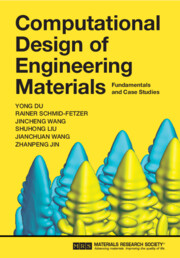Book contents
- Computational Design of Engineering Materials
- Computational Design of Engineering Materials
- Copyright page
- Dedication
- Contents
- Foreword
- Preface
- Acknowledgments
- 1 Introduction
- 2 Fundamentals of Atomistic Simulation Methods
- 3 Fundamentals of Mesoscale Simulation Methods
- 4 Fundamentals of Crystal Plasticity Finite Element Method
- 5 Fundamentals of Computational Thermodynamics and the CALPHAD Method
- 6 Fundamentals of Thermophysical Properties
- 7 Case Studies on Steel Design
- 8 Case Studies on Light Alloy Design
- 9 Case Studies on Superalloy Design
- 10 Case Studies on Cemented Carbide Design
- 11 Case Studies on Hard Coating Design
- 12 Case Studies on Energy Materials Design
- 13 Summary and Future Development of Materials Design
- Book part
- Index
- Plate Section (PDF Only)
- References
6 - Fundamentals of Thermophysical Properties
Published online by Cambridge University Press: 29 June 2023
- Computational Design of Engineering Materials
- Computational Design of Engineering Materials
- Copyright page
- Dedication
- Contents
- Foreword
- Preface
- Acknowledgments
- 1 Introduction
- 2 Fundamentals of Atomistic Simulation Methods
- 3 Fundamentals of Mesoscale Simulation Methods
- 4 Fundamentals of Crystal Plasticity Finite Element Method
- 5 Fundamentals of Computational Thermodynamics and the CALPHAD Method
- 6 Fundamentals of Thermophysical Properties
- 7 Case Studies on Steel Design
- 8 Case Studies on Light Alloy Design
- 9 Case Studies on Superalloy Design
- 10 Case Studies on Cemented Carbide Design
- 11 Case Studies on Hard Coating Design
- 12 Case Studies on Energy Materials Design
- 13 Summary and Future Development of Materials Design
- Book part
- Index
- Plate Section (PDF Only)
- References
Summary
Chapter 6 starts with a definition of thermophysical properties, followed by detailed descriptions of important terms and equations in diffusion, including Fick’s laws on diffusion; four types of diffusion coefficients (self-diffusion, impurity diffusion, intrinsic diffusion, and interdiffusion); atomic mechanisms of diffusion; diffusion equations in binary, ternary, and multicomponent phases; as well as phases with narrow homogeneity range. Short-circuit diffusion is also briefly mentioned. Subsequently, several computational methods, including first-principles calculations, MD simulation, semi-empirical approaches, and DICTRA software, are presented to calculate or estimate diffusivity and atomic mobilities from which various diffusivities can be computed. Modeling of selected important thermophysical properties, including interfacial energy, viscosity, volume, and thermal conductivity, is briefly introduced. A procedure to establish thermophysical databases is described from a materials design point of view. A case study for simulating age hardening in AA6005 Al alloys is demonstrated mainly using thermophysical properties as input to show their importance for materials design.
Keywords
- Type
- Chapter
- Information
- Computational Design of Engineering MaterialsFundamentals and Case Studies, pp. 198 - 263Publisher: Cambridge University PressPrint publication year: 2023

